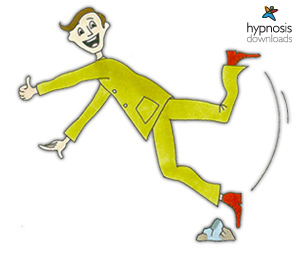The Pitfalls of Positive Thinking
What affirmations have in common with depressive thinking, and how to be truly optimistic
 "Positive thinking has power, but plenty of pitfalls too"
"Positive thinking has power, but plenty of pitfalls too" Do you ever feel like you should be positive but you just don't feel it? No matter how hard you try to look on the bright side?
And now you feel guilty about not feeling positive! A double whammy of negativity - feeling bad for feeling bad!
For all its benefits, the cult of positive thinking has gone too far - its attractive promises cloak several hidden dangers. In this article I'll look at how to use positive thinking for its benefits while avoiding its pitfalls.
There are better ways to feel positive
It's not that I don't think positive affirmations work. They do - for some people. But not, it seems, for those with low self-esteem.
Canadian research found that repeating positive statements such as "I am a lovable person" could be helpful for people with high self-esteem, but actually made people with low self-esteem feel worse.1 Why? Well, from their perspective, they are simply lying to themselves.
There are more effective, natural, and healthy ways to think!
Positive-thinking affirmations claim to work by repetition. Basically, the harder you hit that unconscious mind of yours with the positive-thinking hammer, the deeper the affirmation will go!
But is that really the best way of embracing life's challenges and pleasures?
And here's another question.
Do positive thinking affirmations cause depression?
No, of course they don't! But the type of thinking behind many affirmations has a lot in common with depressive thinking.
Positive affirmations tend to be extreme. So rather than repeating something like "I can be a pretty decent person and am good in some ways and will work hard to improve myself", people who use affirmations tend to tell themselves stuff like "I am perfect in every way!" or "I am a wonderful and beautiful human being!"
So what's wrong with that? And what has that got to do with depressive thinking?
The dangers of extreme thinking
It's well known that depressive thinking consists of extremist, all-or-nothing, black-and-white ways of seeing reality. Psychologists like to call this kind of thinking 'absolutist'.
The extremist depressive mindset has people thinking in simplistic polarities: "This is a total disaster!" or "Nothing ever works out for me!" Subtleties and shades of grey are missed out. Degrees of reality are discounted. Something is either completely this or completely that. This is sometimes called emotional thinking, as strong emotion also tends to be all or nothing, as with the fight-or-flight response.
A 2018 study used "Linguistic Inquiry and Word Count" software to measure levels of linguistic absolutism among 6,400 users of various internet depression and anxiety forums.2 The researchers found that the more depressed and anxious a person is, the more absolutist their language becomes. Those on suicidal ideation forums used the most all-or-nothing language.
Interestingly, the researchers also found that even people on forums for those recovered from depression used more absolutist language compared with the control group. This is suggestive that absolutist thinking may be a risk factor for depression as well as a symptom.
To think positively we also need to know what kind of thinking to spot within ourselves and start to do less of. So apart from extremist, all-or-nothing thinking, which misses out subtle degrees of reality, what other depressing ways of thinking are worth avoiding?
Self-absorption is depressing
When people are depressed their language becomes much more self-referential.3 The more hopeless someone feels, the more personal pronouns they use, such as 'my', 'myself', 'I', and 'mine'. At the same time, language relating to others decreases. Depressed people use far fewer fewer second- and third-person pronouns, such as 'they', 'he', 'she', and 'them'.4
It's not clear whether this increased self-referential thinking is caused by depression or causes it. I suspect it's a bit of both.
When we focus solely on ourselves and our own feelings we tend to ruminate more. Increased rumination, going over and over stuff in your head without taking steps to actually solve problems, has been shown to cause and maintain depression.5
We tend to feel happier when we focus outward: when we feel a sense of awe at nature, or feel 'in the zone' when applying some skill we have naturalized within ourselves through hard practice. We don't tend to feel great when we focus on ourselves extensively.
Notice that self-affirmations tend to focus on the self. They are self-referential and they tend to be absolutist - two features of depressive thinking.
Sure, they are framed positively, but if we do them continually and we start to question them - because of real-world feedback that contradicts them - then we may fall into a negative spiral. This kind of blunt positivity has more in common with depressive thinking than with healthy, life-embracing psychological flexibility.
Extreme self-praise may seem like a good way to correct self-contempt, but perhaps both are just different sides of the same emotional coin. And it's not just praising ourselves that can cause problems.
You get out what you put in
Research found that children lost interest in an activity they had previously been enjoying when they were told they were wonderful or amazing.6 Now they were doing the activity for the sake of the praise rather than the sake of the activity itself. If the praise stopped, what was the point of continuing with the activity?
The best kind of praise (including self-praise) is to recognize the effort we put in, because effort is completely under our control. "You are simply amazing!" can feel pretty meaningless, but "I'm impressed how well you worked on this!" can connect to the reality of the person being recognized.
When I get up in the morning on a work day, I tell myself, "I am going to work to have a good day today. I am going to work as hard as I can." I don't tell myself I'm amazing or wonderful. I don't unduly beat myself up if I am not incredibly hardworking that day or feel a bit tired. I try my best but also recognize that I am human and therefore prone to human frailties. Notice how this is far removed from the absolutist thinking inherent to depressive thinking.
Avoiding absolutism in our thinking, seeing ourselves in degrees, has a positive effect on human psychology. "I didn't do as well at that as I'd liked, but I did work hard on it and I will work to do better in future!" is strangely more positive in its effect than "I am amazing!" (even though I just failed a test!).
It can feel great to ditch the all-or-nothing extremism and take a more nuanced, realistic approach to life.
So how can we live more positively?
The transformative power of genuine positivity
If I tell myself repeatedly, "I am simply wonderful!" (a) it mismatches to reality, (b) it is so absolutist it doesn't allow for any room for improvement, and (c) it ignores the subtleties of the totality of being human.
This thinking is as blunt an instrument as the depressive thinking that has people simplistically telling themselves they are 'evil' or 'totally useless'. As much as possible we need to see the truth of ourselves - not in a judgemental or damning way, but as calmly as possible.
But seeing ourselves calmly and objectively doesn't mean we have to emotionally beat ourselves up.
"I work hard often but sometimes I can be a bit lazy" may be a fairer self-assessment and strangely more hopeful than simply "I am awesome!" First, it connects to the part of me that appreciates truth over self-deception, and second, it's a subtle way of thinking that is far removed from depressive absolutism. It gives me something to work on to self-improve.
Seeing different parts of ourselves, the good and the less good, is the opposite to depressive thinking. Self-acceptance and self-observation are the first steps towards self-improvement. And that's another major reason we need to be careful with the way we praise ourselves and others.
Try hard but cut yourself some slack
Repeating extremely positive self statements - "I am beautiful", "I am perfect", "I am amazing" - may feel good (except, as I mentioned earlier, if we have low self-esteem), but it doesn't actually help us creatively problem solve and develop as people. And it usually doesn't gel with the feedback life gives back to us.
What happens if I've been telling myself that I'm irresistible and I get rejected for a date? Or that I'm perfect but don't get that job I applied for?
I think that to negotiate life effectively and manage our emotions better we need to be able to stop excessive all-or-nothing thinking. We need to recognize when we've worked hard and tried our best, but without overdoing it - we all tend to feel happier when we aren't overly focusing on ourselves.
When we learn to be calmer, relax with uncertainty more, and respond flexibly, then we find purpose in our lives without having to constantly feed ourselves simplistic emotional propaganda of either a negative or a positive kind. Many of the articles I've written on this site will help you do that.
Why it's good to forget the self sometimes
Sometimes we need to forget about ourselves and serve the bigger purpose. Paradoxically, this can make us happier and more productive and successful. Happiness and success become byproducts of living in a certain way, not ends in and of themselves.
Whether I'm writing, creating art, or playing as a team member in a soccer match, I need to ditch the "I am awesome!" stuff. I need to ditch thinking about me at all and become one with my endeavour. If stuff works out, I don't need to be thinking, "It's because I'm awesome!" and if stuff doesn't work out I don't need to make negative blanket statements about myself either, such as "I am pathetic!" What I do need to do is calmly absorb life's feedback and adapt to it.
The power of flexible optimism
I really do think that positive-thinking affirmations can be bad for your mental health. (You can make up your own mind whether you agree with me!) The alternative is to learn how to be flexibly optimistic: a realistic, usable way of thinking that will bolster you against poor mental health, help you enjoy life more, and actually improve your chances of having a successful life. Why? Well, for one, because pessimists give up when optimists keep going. But that's another article.
References
- https://www.ncbi.nlm.nih.gov/pubmed/19493324
- https://journals.sagepub.com/doi/abs/10.1177/2167702617747074
- https://www.tandfonline.com/doi/abs/10.1080/02699930441000030
- https://www.ncbi.nlm.nih.gov/pubmed/6176285
- https://www.bbc.co.uk/news/magazine-24444431
- http://www.ascd.org/publications/educational-leadership/oct07/vol65/num02/The-Perils-and-Promises-of-Praise.aspx






